Understanding the Cost of Water Cremation
How much is water cremation typically costs between $1,500 and $4,000 nationwide, with an average price of $2,500. Like many end-of-life services, what you'll actually pay depends on where you live, which provider you choose, and what services you include in your package.
| Water Cremation Cost Overview | |
|---|---|
| National Average | $2,500 |
| Typical Range | $1,500-$4,000 |
| Lowest Cost (Missouri) | $995 |
| Highest Cost (Vermont) | $4,616 |
| Additional Death Certificates | $13-$25 each |
| Transportation (beyond 30mi) | $2.80/mile |
When families face the difficult journey of saying goodbye to a loved one, understanding costs becomes not just practical but emotionally necessary. Water cremation—sometimes called aquamation or alkaline hydrolysis—offers a gentle alternative to traditional methods. Instead of fire, this process uses water, gentle heat, and alkalinity to return the body to its elemental form.
I've noticed more families asking about greener options lately. They're drawn to water cremation not just for its smaller environmental footprint, but also because it often sits in a comfortable middle ground price-wise. It typically costs more than flame cremation but less than a traditional burial—making it financially accessible while honoring ecological values.
At American Mortuary Coolers, we've researched how much is water cremation costs extensively while working with funeral homes across the country. Through supplying equipment for these services, we've gained unique insights into what drives pricing in different regions.
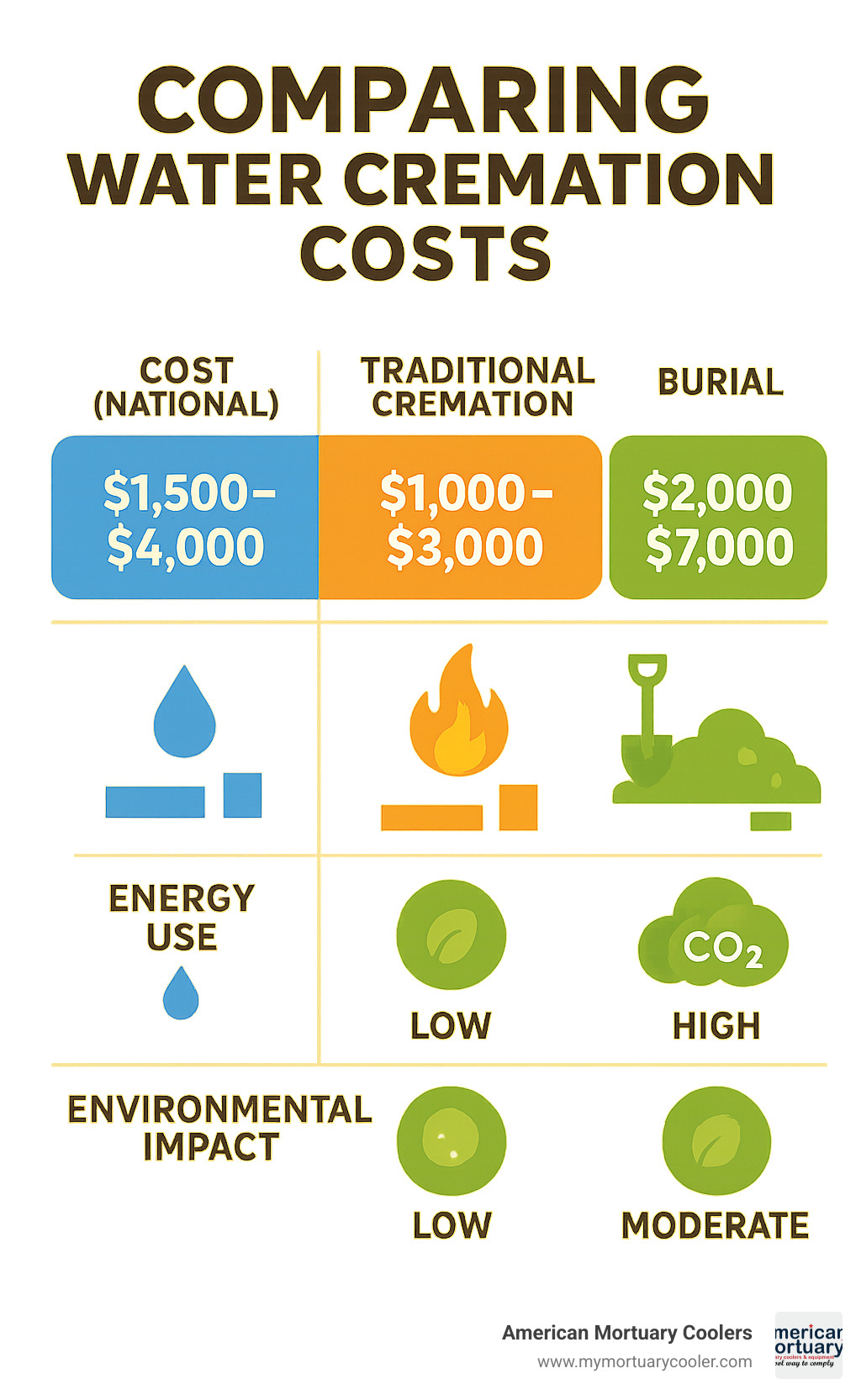
If you're new to this topic, here are some helpful resources to understand the basics:
Why Cost Matters When Choosing an Eco-Friendly Farewell
Planning end-of-life arrangements means balancing heartfelt wishes with practical realities. Money conversations can feel uncomfortable during grief, but understanding costs upfront prevents additional stress later.
As City of Oaks Funeral Home & Cremations wisely puts it, "Nobody likes surprise costs added in at the last minute." This sentiment resonates with so many families we've worked with over the years. What initially seems affordable can quickly become overwhelming when unexpected fees appear.
The funeral industry hasn't always been known for price transparency. Many families tell us they appreciate water cremation's middle-ground pricing, but they're often confused about what's actually included in the quoted price. Some providers advertise a tempting base rate that doesn't include services you might naturally assume are part of the package.
What You'll Learn in This Guide
I've created this guide to help you steer these waters with confidence. By the time you finish reading, you'll understand:
- National average costs and what factors influence pricing in your area
- How prices compare state by state, and where the service is legally available
- Common hidden fees that might surprise you (and how to avoid them)
- A clear visual map showing where water cremation is legal and operational
- Practical steps for planning and budgeting for this eco-friendly option
My goal is to help you make choices that honor both your values and your budget. End-of-life decisions are deeply personal, and having clear information about how much is water cremation costs can provide some peace of mind during a difficult time.
How Much Is Water Cremation? National Averages & Key Numbers
When families ask me "how much is water cremation?", I wish there was a simple one-size-fits-all answer. The truth is, prices vary widely across the country, influenced by your location, local competition, and what's included in the package.
Looking at the national picture, water cremation typically costs between $2,000 and $3,500, with the median price settling at about $2,593. If you're in Missouri, you might find rates as low as $995, while in Colorado, particularly if you choose the Parting Stone solidification option, prices can reach $5,900.
One interesting benefit worth mentioning is that water cremation returns about 20-30% more remains than flame cremation. This means families receive more of their loved one's remains, which can provide additional comfort and more options for memorials, though you may need a slightly larger urn.
As City of Oaks Funeral Home proudly points out, "We cost about half the amount of big corporate funeral homes in the area." This highlights an important shopping tip – independent providers often offer more competitive pricing than large funeral chains.
For those wanting to dive deeper into how water cremation costs compare with other disposition methods, you can explore more info about cost comparisons.
How much is water cremation in 2024?
In 2024, if you're wondering how much is water cremation, the national average continues to hover around $2,500. The good news is that prices have begun to stabilize as more providers enter the market. According to industry data similar to what the National Funeral Directors Association tracks, water cremation typically costs about $900 more than traditional flame cremation but remains significantly less expensive than burial.
Why the higher price tag compared to flame cremation? A big factor is the substantial investment required for the equipment. Alkaline hydrolysis machines cost funeral homes between $180,000 and $270,000, compared to around $135,000 for flame cremation equipment. This higher initial investment naturally affects the service price, especially in areas with few providers.
As Joshua Siegel, a funeral industry expert, explains: "Limited demand for aquamation equipment keeps prices high, but they may decrease with popularity." This offers hope that as water cremation becomes more mainstream, economies of scale might eventually bring consumer prices down.
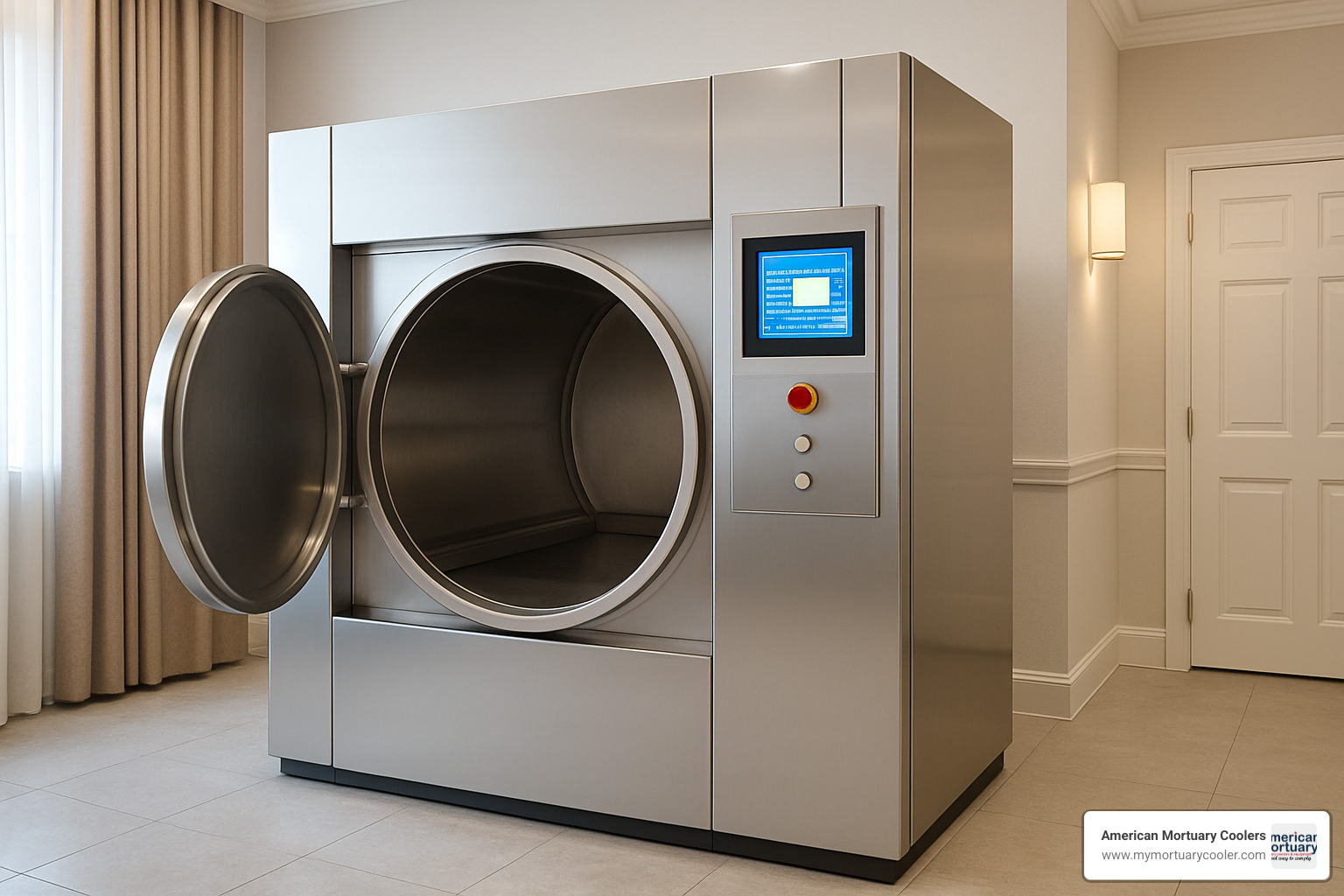
Real-World Price Examples
To give you a clearer picture of what real families are paying across the country, here are some actual pricing examples:
Endswell Funeral Home in North Carolina charges $3,500 for their complete aquamation service. This includes local transportation, the aquamation process itself, death certificates, and return of remains in an eco-friendly urn.
In Chicago, Caring Cremations offers their "Green Aqua Flameless Water Bio-Cremation" for $1,497. They emphasize the environmental benefits, noting it has "one-tenth the carbon footprint of flame cremation."
Back in North Carolina, City of Oaks Funeral Home prices their aquamation at $2,640.59. This comprehensive package includes basic service, transfer of remains, the aquamation fee, three certified death certificates, a wooden urn, and even the sales tax.
For those in Colorado, Be a Tree Cremation offers water cremation with an urn for $3,920, or $5,900 if you choose their Parting Stone option, which transforms the remains into solid stones rather than ash.
These examples show how pricing and included services can vary significantly. For more specific pricing in your area, you might want to contact Endswell pricing or reach out to providers near you.
When comparing prices, ask exactly what's included. Some providers offer all-inclusive packages, while others may have a lower base price but add fees for services you might assume were standard.
State-by-State Price Breakdown & Legal Map
The world of water cremation reveals a patchwork of availability and pricing across America. While this gentle disposition method gains popularity, its accessibility varies dramatically depending on where you call home. Currently, water cremation is legal in 25 states but only actually available in 17, creating what some funeral directors call "aquamation deserts" – places where the service is technically allowed but no providers exist yet.
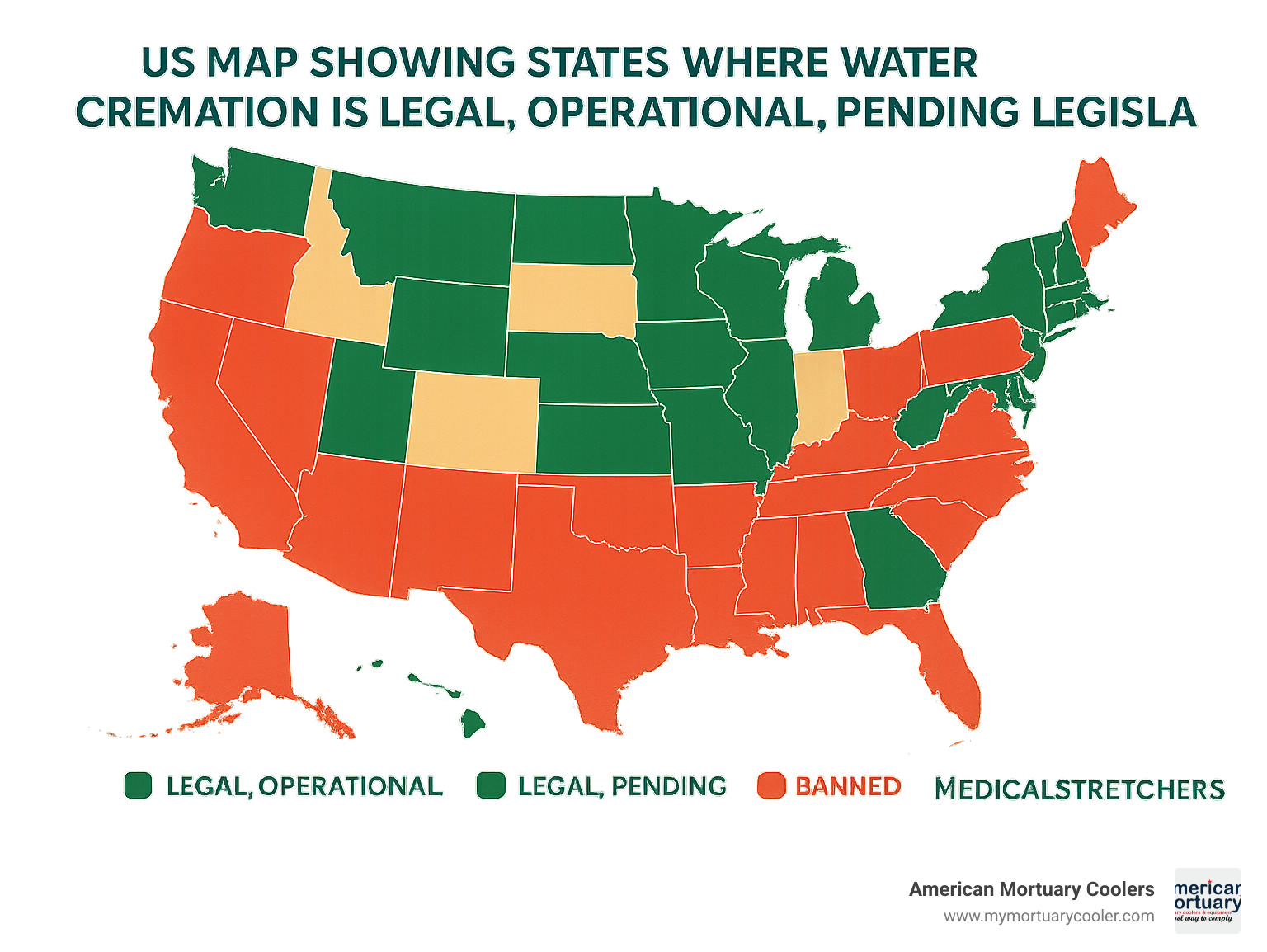
This limited availability creates quite a rollercoaster of pricing. Here's a snapshot of the range you might encounter in states where water cremation is up and running:
| State | Low-End Cost | High-End Cost | # of Providers |
|---|---|---|---|
| Alabama | $1,995 | $2,895 | 3 |
| California | $3,597 | $4,995 | 6 |
| Colorado | $3,920 | $5,900 | 2 |
| Florida | $2,395 | $3,995 | 8 |
| Illinois | $1,497 | $3,295 | 4 |
| Minnesota | $2,395 | $4,995 | 5 |
| Missouri | $995 | $2,995 | 3 |
| North Carolina | $2,640 | $3,500 | 2 |
| Oregon | $2,195 | $3,995 | 4 |
| Vermont | $4,616 | $5,095 | 1 |
| Washington | $2,705 | $3,995 | 6 |
How much is water cremation in your state?
When researching how much is water cremation costs where you live, prepare for some surprising variations. The price differences between states can be eye-opening – sometimes even shocking.
Take Alabama, for instance. With services averaging around $2,300, it offers some of the South's more reasonable options. Providers cluster mainly around Birmingham and Montgomery, creating healthy competition that helps keep prices in check.
Meanwhile, in California, prepare for a steeper bill starting around $3,597. This premium reflects the Golden State's higher operational costs and stringent environmental regulations that providers must steer. Despite the higher price tag, California's six providers report steady growth in families choosing this eco-friendly option.
Then there's Vermont, where the lone provider charges $4,616 – a whopping 95% above the national median. Without competition and facing higher Northeastern operational costs, this premium price reflects what happens in a limited market.
As one Minnesota funeral director shared with us, "Our pricing isn't just about the service itself. We've invested heavily in specialized equipment and training to offer water cremation. We're hoping that as more families choose this option, we'll eventually see economies of scale bring prices down for everyone."
Availability & Out-of-State Options
Living somewhere water cremation isn't available doesn't mean it's off the table. Many forward-thinking providers have established relationships with facilities in neighboring states and can help arrange transportation.
If crossing state lines becomes necessary, keep these practical considerations in mind:
Transportation fees typically run about $2.80 per mile beyond the first 30 miles. This can add up quickly for longer journeys, so factor this into your budget calculations.
Shipping remains back to your home state follows different rules depending on the carrier. Most allow cremated remains to be shipped via USPS or courier services with proper documentation and packaging.
Veterans discounts often apply regardless of residency status, with many providers offering 10% off for those who served – a small but meaningful acknowledgment of their sacrifice.
"We transport throughout Colorado and can arrange out-of-state transportation when needed," explains Be a Tree Cremation in Colorado. This kind of flexibility is common among providers near state borders who understand that families seeking this specific service may need to travel.
If water cremation aligns with your values but isn't locally available, it's worth reaching out to providers in neighboring states. Many have well-established protocols for helping families from "aquamation deserts" and can walk you through the logistics and associated costs with compassion and clarity.
Water Cremation vs Flame Cremation vs Burial: Cost & Environmental Math
When families face end-of-life decisions, both financial and environmental considerations often come into play. Water cremation occupies a thoughtful middle ground - costing a bit more than traditional flame cremation but significantly less than burial, while offering impressive ecological benefits.
Let's look at how these three common options stack up against each other:
| Factor | Water Cremation | Flame Cremation | Traditional Burial |
|---|---|---|---|
| Average Cost | $2,000-$3,500 | $1,600 | $7,000-$9,000 |
| CO₂ Emissions | 50 kg | 400 kg | 250 kg |
| Energy Use | 90% less than flame | High temperature fuel | Embalming chemicals |
| Land Use | None required | None required | Plot required |
| Mercury Emissions | None | Yes (from dental fillings) | None |
| Processing Time | 6-20 hours | 2-3 hours | N/A |
| Remains Returned | 20-30% more than flame | Standard amount | N/A |
"Our families are often surprised to learn that how much is water cremation impacts both their wallet and the planet," shares one funeral director we interviewed. "The process uses just a fraction of the energy of flame cremation, produces no greenhouse gases or toxic substances, and the water used is safely treated and recycled."
For those wanting to dive deeper into the scientific research behind these emission comparisons, scientific research on cremation emissions offers excellent detailed information.
Dollars and Emissions Side-by-Side
The numbers tell a compelling story about why more families choose water cremation despite its slightly higher price tag compared to traditional flame cremation.
On the energy front, water cremation is remarkably efficient. It typically uses about 7 cubic meters of natural gas compared to a whopping 92 cubic meters for flame cremation. Electricity usage follows a similar pattern: 9 kWh for water versus 29 kWh for flame. Traditional burial brings different environmental concerns, including ongoing land maintenance and the use of embalming chemicals that eventually leach into soil.
When it comes to carbon impact, the differences are striking. How much is water cremation contributing to climate change? Only about 50 kg of CO₂ equivalent - roughly one-eighth the amount produced by flame cremation (approximately 400 kg). Traditional burial falls in between at around 250 kg CO₂ equivalent when you factor in the concrete vault, casket, and perpetual grounds maintenance.
Land use presents another important consideration. Traditional burial requires dedicated land forever, while both forms of cremation free families from this constraint. Many find comfort in creative options like scattering gardens or keeping remains in meaningful locations. For those who prefer burial, urn garden plots can accommodate multiple urns in a single space, significantly reducing per-person costs.
As one thoughtful funeral director put it: "When families understand they're not only making an environmentally responsible choice with water cremation, but also receiving 20-30% more remains to share among loved ones, many feel the modest additional cost is completely justified."
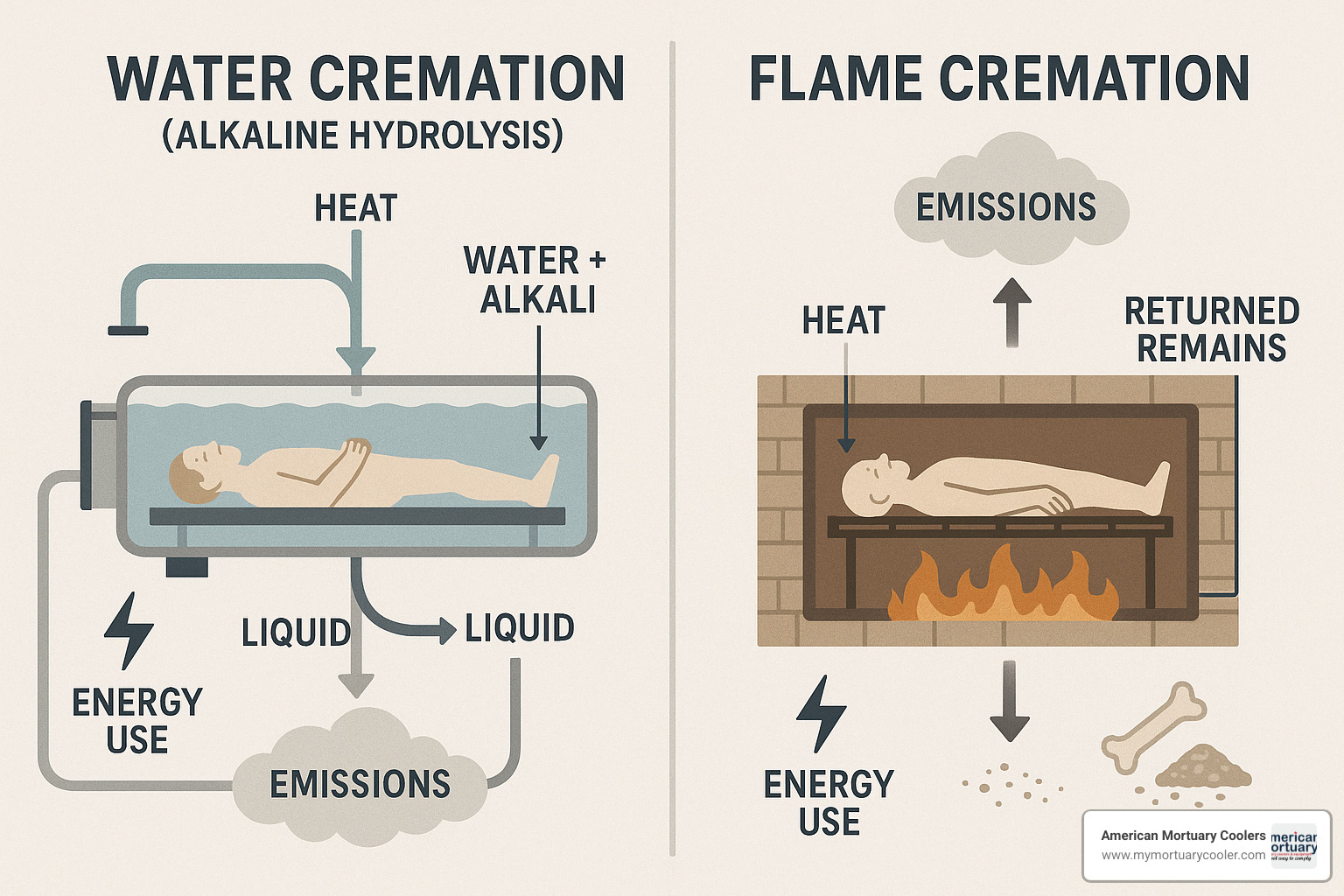
Price Drivers: Packages, Add-Ons, Discounts & Hidden Fees
When families ask "how much is water cremation," they're often surprised by the range of factors that influence the final price. Understanding these elements helps you budget appropriately and avoid unexpected costs during an already difficult time.
The distance traveled to transport your loved one significantly impacts pricing, with most providers charging around $2.80 per mile beyond their standard service area (typically 30 miles). Death certificates, an essential document you'll need multiple copies of, range from $13-$25 each depending on your state.
"Many families don't realize they'll need at least 5-10 death certificates for various accounts and legal matters," explains one funeral director we spoke with. "Those small fees add up quickly."
If you're considering a viewing before the aquamation process, expect to pay around $250 for viewing room usage. Specialty urns can range dramatically from simple $100 containers to artistic pieces exceeding $500. The increasingly popular Parting Stone option, which transforms remains into solid memorial stones rather than ash, adds $1,500-$2,000 to your total.
Behind the scenes, funeral homes factor equipment costs into their pricing. With aquamation machines costing $180,000-$270,000, this equipment amortization significantly influences service pricing, especially for smaller providers.
For a deeper dive into what different packages typically include across providers, check out more info about package inclusions.
What's Included in a Standard Package?
Most aquamation providers bundle essential services into their base package. When comparing providers, ensure their standard offering includes body pickup from the place of death, temporary refrigeration (crucial since embalming isn't used), the actual alkaline hydrolysis process, and a basic container for returning the remains.
"We believe in transparent pricing," shares City of Oaks Funeral Home. "Our package includes everything families need without surprise additions later."
The basic urn included in standard packages is typically simple but dignified. Many families choose to upgrade, but having a basic option included gives you breathing room to make that decision without pressure.
Unlike traditional services, aquamation packages rarely include ceremonial elements like memorial services or celebrants. These are typically offered as add-ons, allowing families to customize according to their needs and budget.
Common Hidden Fees to Watch
The funeral industry has unfortunately earned a reputation for surprising families with unexpected charges. When researching how much is water cremation will cost your family, watch for these commonly hidden fees:
Permit filing fees often appear separately from the base price, despite being mandatory. Weekend surcharges can add hundreds if your loved one passes during non-business hours. Some providers even charge "expedited service" fees if you need the process completed quickly.
One significant advantage of water cremation over flame cremation: no pacemaker removal fee. While flame cremation requires removing pacemakers to prevent explosion, water cremation safely processes remains without this step.
"Always ask for the General Price List and review it line by line," advises one consumer advocate. "It's your legal right to see all costs itemized before making decisions."
How to Save on Water Cremation
Finding affordable aquamation services doesn't mean compromising dignity. Several strategies can help manage costs while honoring your loved one's memory.
Direct aquamation—skipping viewing and ceremonial services—offers the most affordable option, sometimes saving $500-$1,000. Many providers offer bundle discounts when combining multiple services, so ask about package pricing rather than selecting services individually.
When comparing providers, request their General Price Lists (GPLs) and review them side-by-side. Some providers like City of Oaks offer price matching plus an additional 10% discount if you find a lower advertised price.
Pre-planning and prepaying locks in current rates against future increases, potentially saving thousands. Many providers offer flexible payment plans for pre-arrangements, making this option accessible even on tight budgets.
"The most important thing is communicating your budget constraints," shares one funeral director. "We can almost always find ways to work within your means while providing a meaningful farewell."
By understanding what drives how much is water cremation costs in your area, you can make informed decisions that honor both your loved one and your financial reality.
Planning Your Water Cremation: Process, Legalities & Memorial Options
Understanding the water cremation process helps families prepare logistically and emotionally. Here's what to expect:
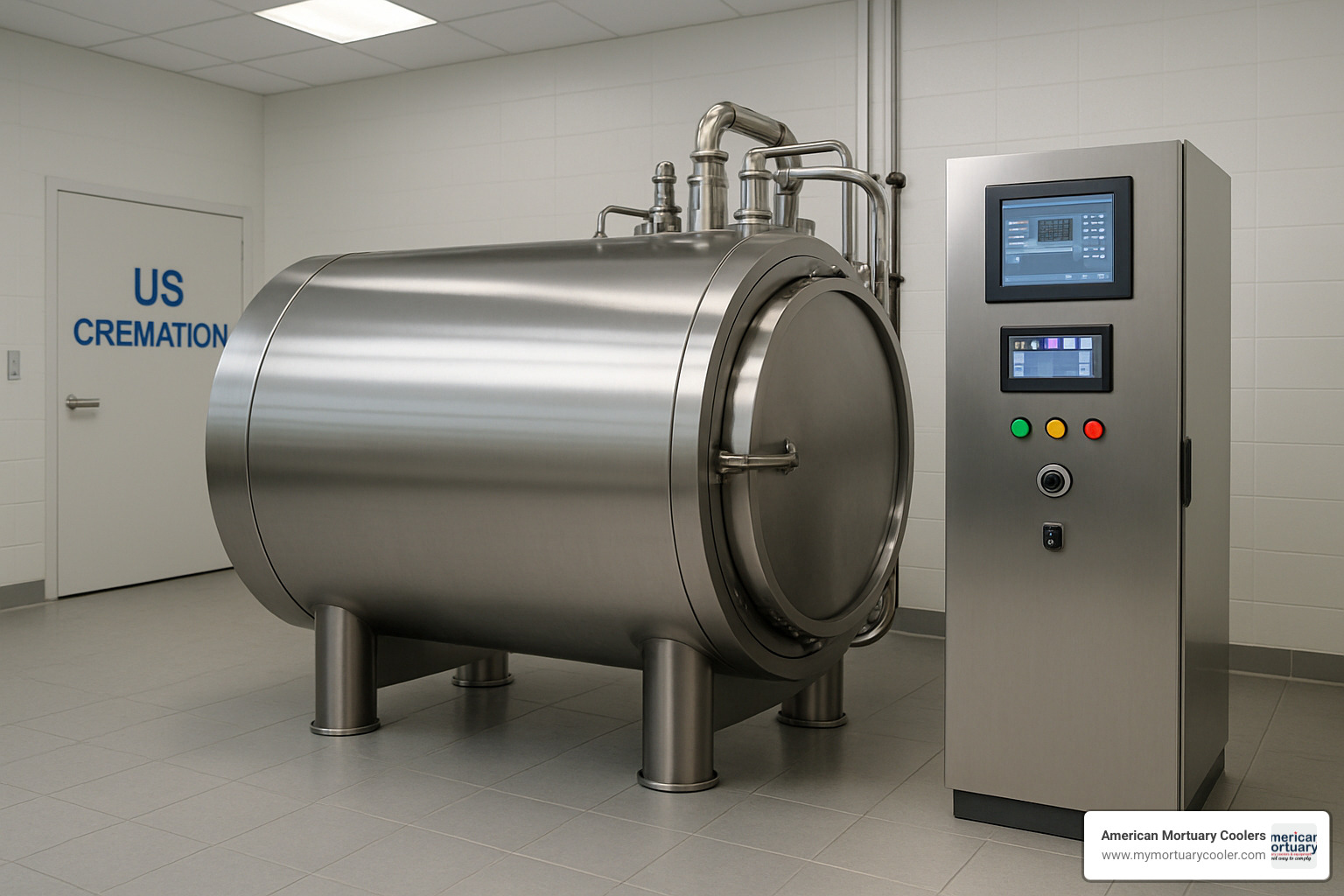
Water cremation follows a gentle, dignified five-step journey. First, your loved one is transported to the facility. Then, they're prepared and placed in a biodegradable shroud—no embalming needed, just a natural wrapping. Next comes the actual process, where the body rests in a stainless steel vessel filled with water and a gentle alkali solution. Over the next 4-16 hours (depending on the equipment), this warm solution carefully dissolves soft tissue, leaving only bone fragments. Finally, these fragments are collected, processed into a fine powder, and returned to your family.
One of the comforts many families find with water cremation is how it differs from flame-based methods. There's no need to remove pacemakers, which saves both time and additional fees. You'll receive approximately 20-30% more remains than with flame cremation, giving you more options for memorials or sharing among family members. And many people appreciate the pure, white color of the remains—they tend to be lighter than those from traditional cremation.
If you're curious about the legal landscape in your state, you can explore more info about laws to understand local regulations.
Step-by-Step Arrangement Timeline
When planning water cremation, families can generally expect a 5-7 day timeline from start to finish.
The journey begins on day one, when death occurs. You'll contact your chosen provider, arrange transportation, and complete initial paperwork. During days 1-2, you'll have time to decide whether you'd like a viewing (some providers offer this option), select an urn or other memorial options, and arrange any religious services that are important to your family.
The actual water cremation process typically happens during days 2-3. This gentle process takes place, followed by careful processing of the remains. By days 5-7, you'll receive your loved one's remains, along with death certificates and completion of final paperwork.
"Our standard timeline is 5-7 business days," notes Be a Tree Cremation, which aligns with most providers' timeframes. Some facilities do offer expedited services for an additional fee, but the inherently gentle nature of water cremation typically requires at least 24-48 hours for the complete process.
Environmental & Religious Perspectives
The environmental benefits of water cremation speak for themselves. This process uses 90% less energy than flame cremation, produces no mercury emissions from dental fillings, and creates no greenhouse gases. In some locations, the water effluent can even be recycled as fertilizer, completing a natural cycle of return to earth.
Religious perspectives on how much is water cremation and the process itself continue to evolve. The Catholic Church hasn't issued an official position, though some dioceses have expressed concerns. Many Buddhist traditions welcome water cremation, seeing it as aligned with natural decomposition principles. The Green Burial Council recognizes it as an environmentally preferable option. Jewish communities vary in their acceptance, with Reform congregations generally more open than Orthodox ones.
One provider shared: "Families often tell us they prefer a process that does not use fire or flame, finding it gentler and more aligned with their spiritual beliefs about returning to nature." This sentiment reflects how many people find comfort in water cremation's gentler approach.
FAQs on how much is water cremation & more
Is water cremation legal everywhere?
No, not yet. Currently, water cremation is legal in 25 states but only operational in 17. States where it's legal include Alabama, California, Colorado, Florida, Georgia, Idaho, Illinois, Kansas, Maine, Maryland, Minnesota, Missouri, Nevada, North Carolina, Oregon, Utah, Vermont, and Washington, among others. Several additional states have legislation pending. If you're in a state where it's not yet available, many providers can help arrange transportation to the nearest facility.
When do we get remains back?
Most families receive their loved one's remains within 5-7 business days after death. The actual water cremation process takes 4-16 hours depending on the equipment used, followed by careful processing of the bone fragments into a powder form similar to traditional cremation. Your provider can give you a more specific timeline based on their particular process and current volume.
Are ashes safe for plants?
Absolutely! Water cremation ashes are actually wonderful for plants. They're rich in calcium and beneficial for soil, making them ideal for living urns and memorial gardens. "The remains are sterile, fine, and 100% safe to handle," as one provider explains. This makes them perfect for various memorial options—whether you're planning to scatter them in a special garden, incorporate them into a living memorial, or even use them to nourish a memorial tree.
At American Mortuary Coolers, we've seen how funeral homes are adapting to meet the growing demand for eco-friendly options like water cremation. Our equipment specialists work with funeral directors nationwide who are expanding their services to include this gentle alternative. If you're considering water cremation, we encourage you to explore equipment & supplies that make this compassionate option possible.
Conclusion
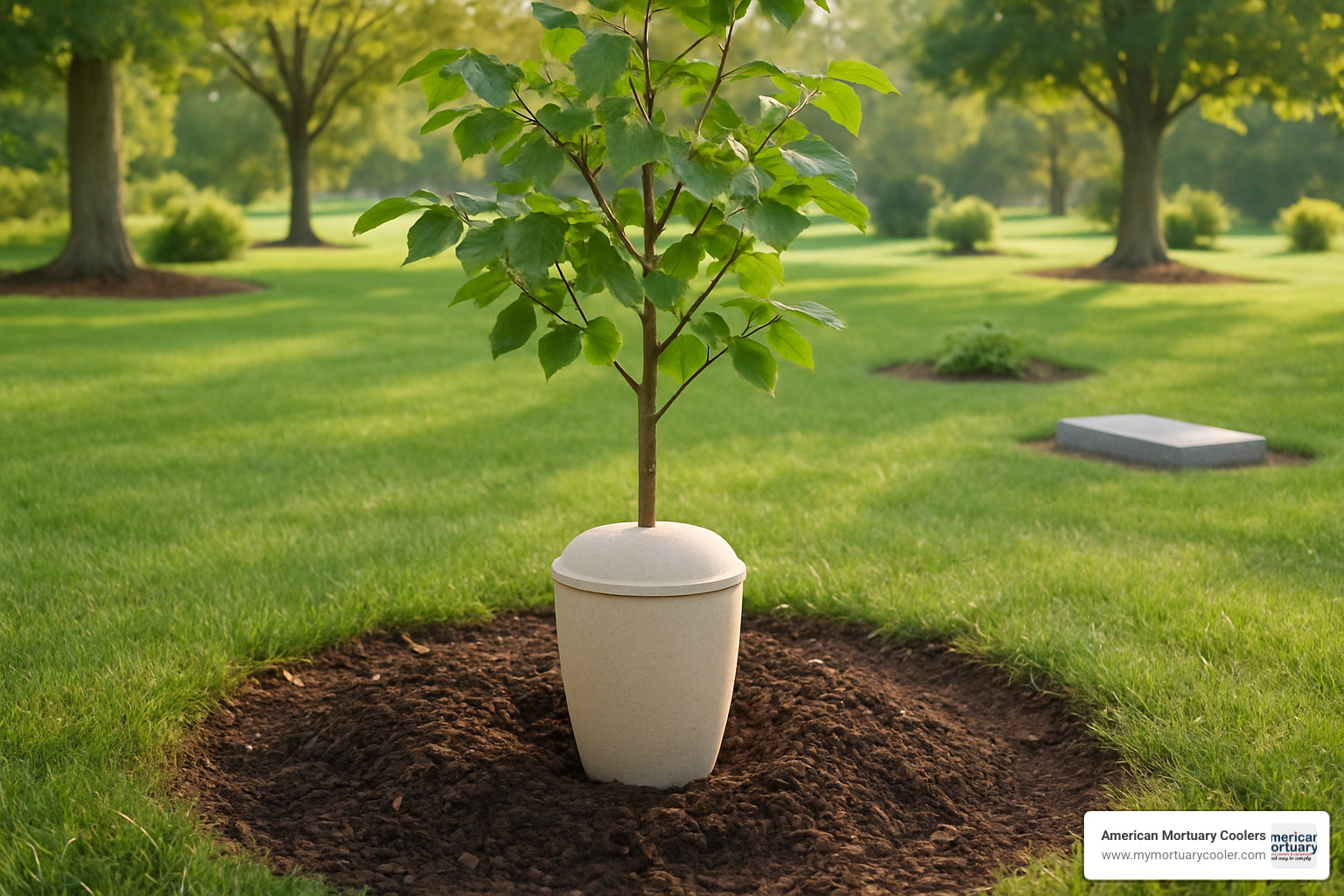
As we've explored throughout this guide, how much is water cremation varies considerably across the country. Most families can expect to pay between $1,500 and $4,000, with that price reflecting not just the service itself, but also the provider's location, included services, and regional availability.
Water cremation occupies a thoughtful middle ground in the end-of-life landscape. While it typically costs more than flame cremation, many families find the environmental benefits and the comfort of a gentler process worth the additional expense. The return of 20-30% more remains also creates more opportunities for sharing among family members or creating multiple memorials.
When planning for water cremation, keeping a few practical considerations in mind can make a significant difference in your experience and final costs. Start by researching local providers and requesting detailed General Price Lists—this transparency helps avoid surprises later. Take time to clarify exactly what's included in any quoted price, as packages can vary dramatically between providers.
For families in states where water cremation isn't yet available, transportation costs become an important budget item. Some providers offer transportation services across state lines, but these fees can add up quickly at roughly $2.80 per mile beyond the standard service area.
Don't hesitate to ask about available discounts. Many providers offer reduced rates for veterans, pre-planning arrangements, or choosing direct service without viewing or ceremony options. These savings can make this eco-friendly choice more accessible for budget-conscious families.
We at American Mortuary Coolers have witnessed the growing interest in water cremation as we support funeral homes with the specialized equipment needed to offer this service. Our custom mortuary coolers and related equipment are designed specifically to complement the water cremation process, providing complete solutions that we deliver directly across the contiguous 48 states.
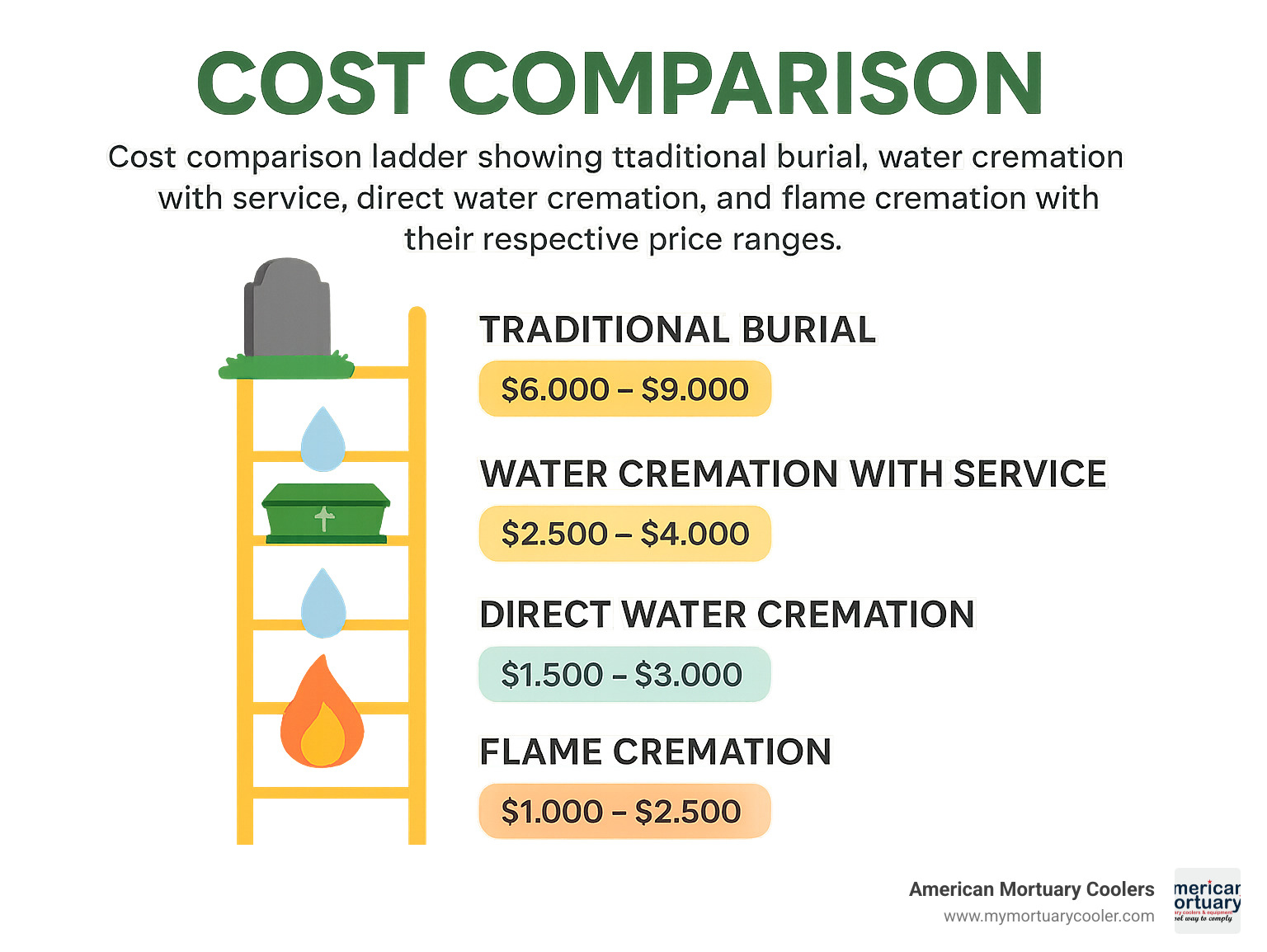
The growth of water cremation represents something meaningful in our approach to death care—a return to gentler processes that honor both the person who has died and the planet they're leaving behind. It offers environmental benefits without the higher costs and land use of traditional burial, creating a thoughtful middle path for families navigating difficult decisions.
For funeral homes interested in expanding their services to include this increasingly requested option, we invite you to explore equipment & supplies designed specifically for modern, eco-conscious facilities.
In the end, understanding the true costs and benefits of water cremation allows families to make choices that align with both their financial realities and their values. Whether motivated by environmental concerns, the gentler nature of the process, or simply a desire for something between traditional options, water cremation offers a meaningful alternative worth considering.
















